
[Megacampaign] A Saga Without Heroes Part 1: Liege-Lords
- Thread starter Dovahkiing
- Start date
-
We have updated our Community Code of Conduct. Please read through the new rules for the forum that are an integral part of Paradox Interactive’s User Agreement.
You are using an out of date browser. It may not display this or other websites correctly.
You should upgrade or use an alternative browser.
You should upgrade or use an alternative browser.
welcome aboard! as we approach the 2,000 view mark, I would like to thank all of you ReadAARs new and old for reading (and hopefully enjoying), and especially Avindian, Danasher, Sergei Meranov, Omen, Videonfan, and the newest: Rendap, for commenting!
Be sure to check back tomorrow or Friday for more medieval soap opera as Olaf beats Longshanks by two hundred and seventy years...
Be sure to check back tomorrow or Friday for more medieval soap opera as Olaf beats Longshanks by two hundred and seventy years...
Chapter 13:
Merry Old Gwynedd
Excerpted from Son of the Raven, by Gudrod Einarsson, ©The author, 2012
Used with permission.
1074 dawned, grey and muddy. From his window in Nidaros Castle Olaf would have been watching the rain pound his home mercilessly, taking no account of humanity and its needs. It reflects my life, he thought. I started at the top of the world, doing what my father couldn't, and now I quickly approach the bottom. Hope went out of his body just as quickly as the water from heaven hit the roofs. What would Father say? Olaf knew it wouldn't be anything good. It would run something like: "You're a damnable, spineless, coward. Do you think you really have the right to sit on that throne just because I did? Fool, you are no fit king for Norway.
Just as those unhappy thoughts were streaming through his mind, a messenger tapped on his back. Startled, Olaf spun around. The messenger said: "Sire, there is a man who wishes to confer with you." "Bring him in." said Olaf with a sigh.
The man came into the room. A young, not too impressive-looking, rather pale, spoke: "Sire, I am Maredudd ap Gruffyd, of the house of Seisyll. I have come to petition you for your mighty aid."
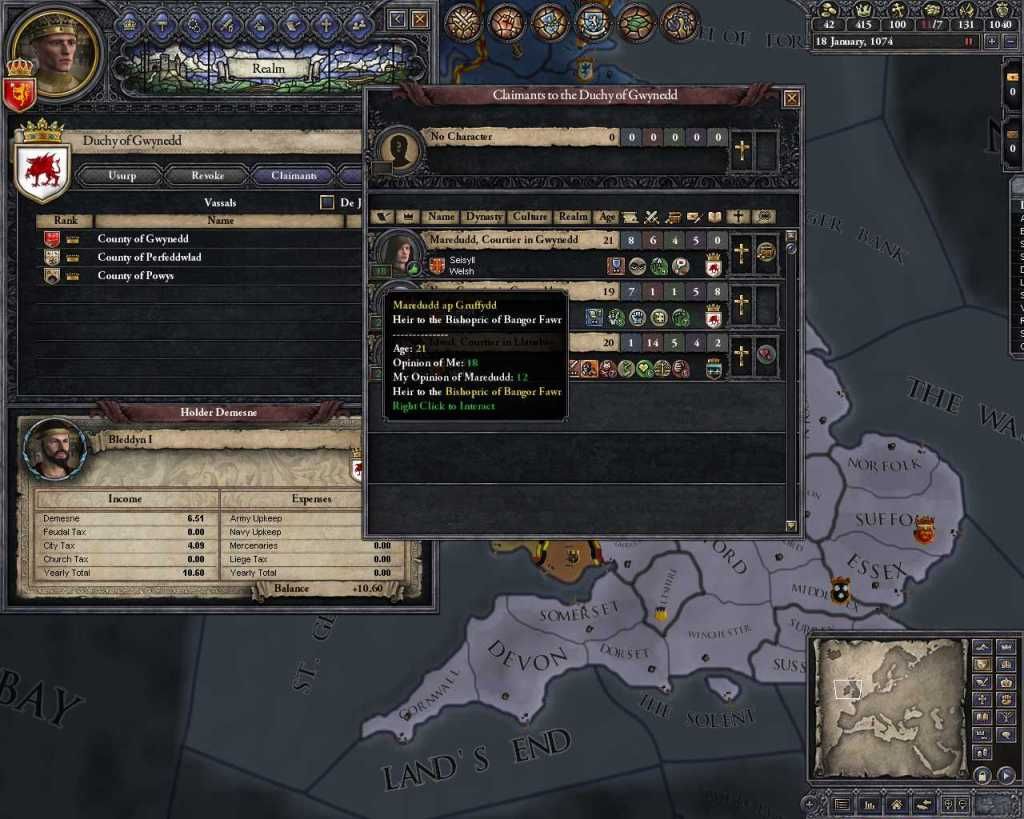
"You're Mare of Gruff of House Sayso?"
Maredudd shook his head. "My speech may be foreign to you, as I am from the noble country of Cymru, but as a fellow human being I hope you will help me. You see, that rat Dug Bleddyn of Gwynedd considers me a threat so he targeted me as a threat to his pampered being, and instead of showing mercy and killing me, he appointed me heir to the aged Bishop of Bangor Fawr. Already he is ill and will probably not recover. He intends to trap me in my canon robes! I implore Your Majesty to help me!"
The gears in Olaf's head already began to work. Maredudd waited as Olaf thought. After half a minute or so, Olaf smiled. "How about an earldom?"
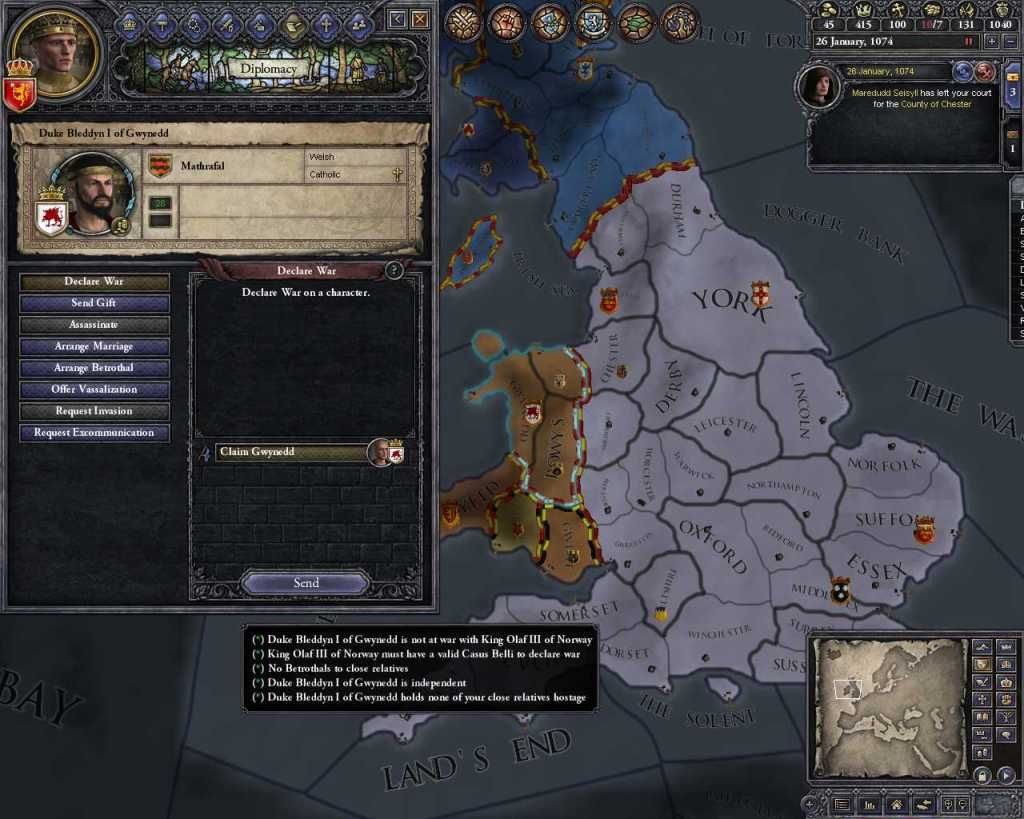
But Olaf's mind's eye looked beyond Chester, into Wales.
Excerpted from A Saga Without Heroes, by Erik Haraldsson, ©2012 Nidaros University Press.
Used with permission.
With the declaration of war the Royal Messenger Corps was struck by a great flurry of activity. Riders went out from Nidaros to the ring of castles dotting the coast of Norway and to Herjalden and Finnmark, and many boats were commandeered to transport the riders to England, Shetland and Orkeny, and faraway Iceland. All of them bore the same message: King Olaf requests your troops for his war against the perfidious Duke Bleddyn of Gwynedd. Another rider made his way to the court of the independent Duke Gudrod of the Isles in Innse Ghall, asking the King's brother-in-law for aid, but as usual Gudrod refused.
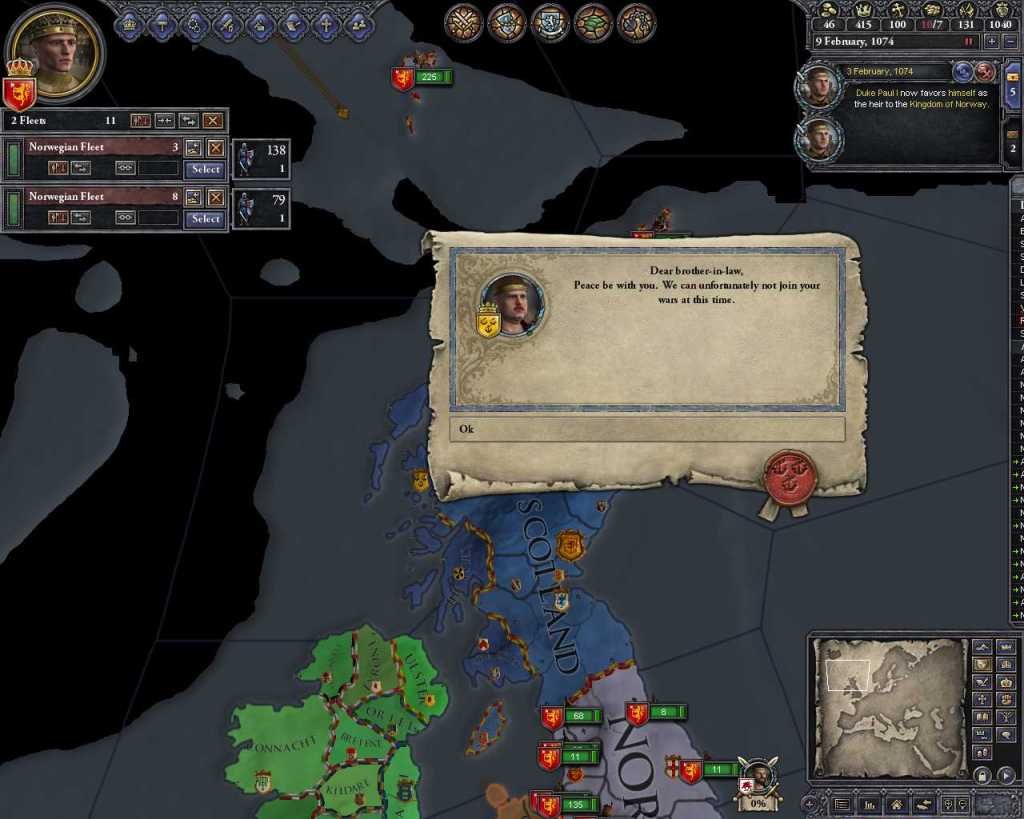
And in the midst of all this warlike activity, there was one messenger with a rather different message:
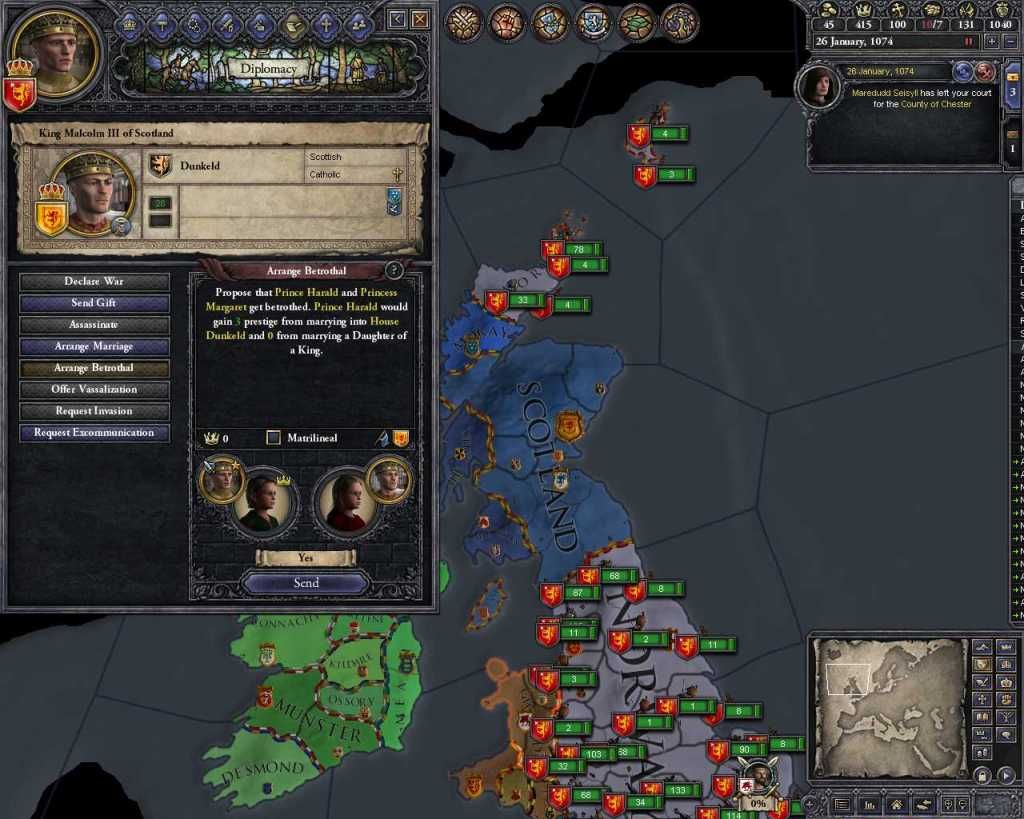
As the troops of the Kingdom of Norway and England mobilized, as farmers were taken away from their lands which they had worked so long on and many would never see again, on the seventh of February another messenger in a courier-filled era came to Nidaros:
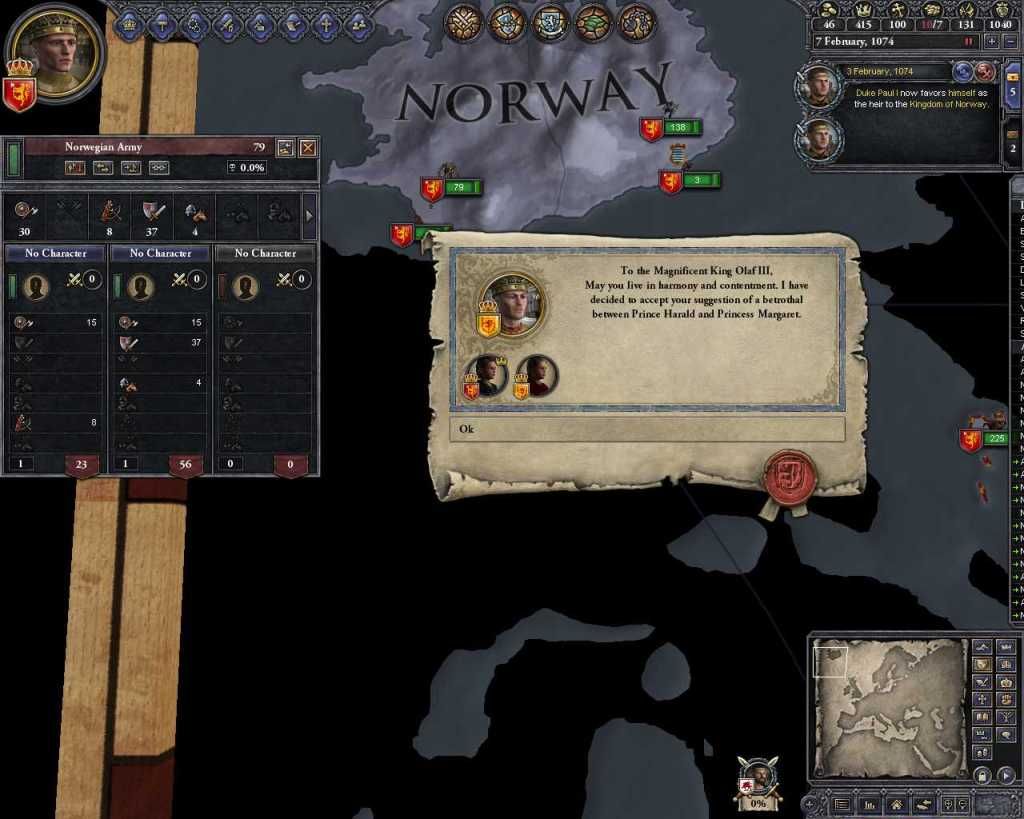
A canny move, no doubt, both sealing an alliance between the two greatest powers in Britain, and when Malcolm died a claim on his crown would go to Margaret, which Harald would be able to exploit to turn Norway into the owner of basically all the landmass of Britain, from Tintagel to Kirkwalll.
March 1074 brought two pieces of good news to Olaf as he marched to board his ships to Wales:
Firstly, on the third of March, in the only significant engagement of the war, Olaf's English troops completely decimated Bleddyn's levies near his capital in Castle Mathrafal.
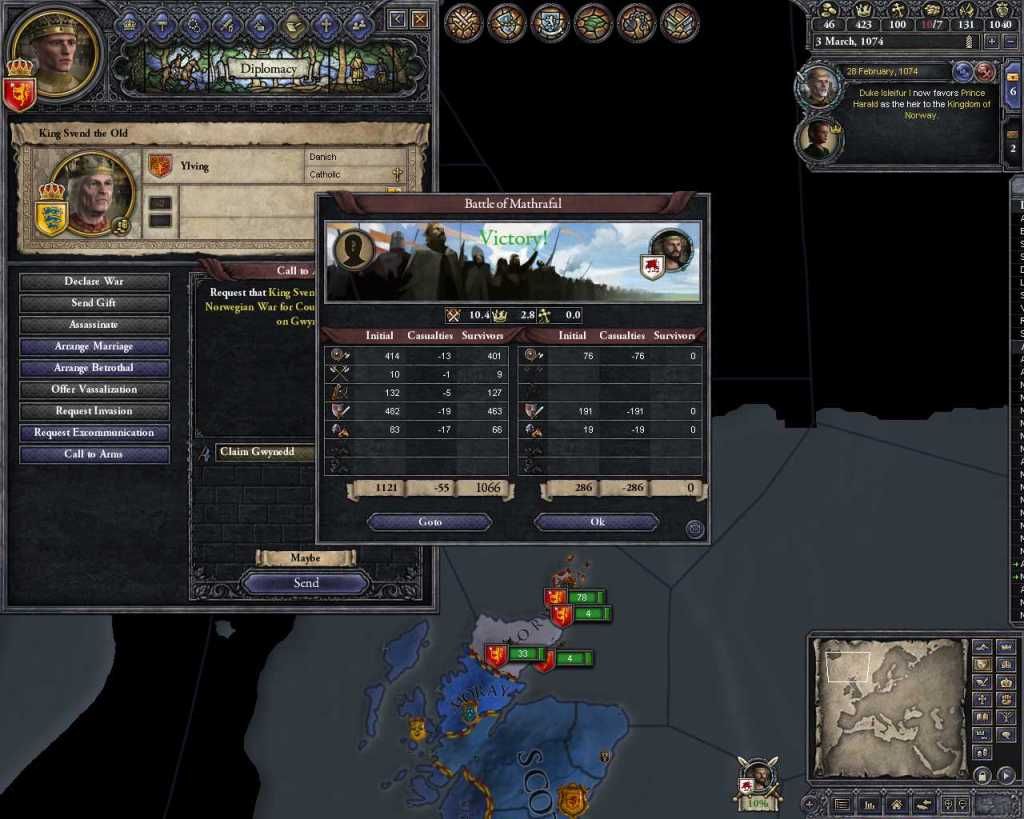
(OOC: That 'remaining troops' number is my lucky one...)
Secondly, a son of Godwin died.
(Ooo, which one was it? Keep following for the answer!)
Merry Old Gwynedd
Excerpted from Son of the Raven, by Gudrod Einarsson, ©The author, 2012
Used with permission.
1074 dawned, grey and muddy. From his window in Nidaros Castle Olaf would have been watching the rain pound his home mercilessly, taking no account of humanity and its needs. It reflects my life, he thought. I started at the top of the world, doing what my father couldn't, and now I quickly approach the bottom. Hope went out of his body just as quickly as the water from heaven hit the roofs. What would Father say? Olaf knew it wouldn't be anything good. It would run something like: "You're a damnable, spineless, coward. Do you think you really have the right to sit on that throne just because I did? Fool, you are no fit king for Norway.
Just as those unhappy thoughts were streaming through his mind, a messenger tapped on his back. Startled, Olaf spun around. The messenger said: "Sire, there is a man who wishes to confer with you." "Bring him in." said Olaf with a sigh.
The man came into the room. A young, not too impressive-looking, rather pale, spoke: "Sire, I am Maredudd ap Gruffyd, of the house of Seisyll. I have come to petition you for your mighty aid."

"You're Mare of Gruff of House Sayso?"
Maredudd shook his head. "My speech may be foreign to you, as I am from the noble country of Cymru, but as a fellow human being I hope you will help me. You see, that rat Dug Bleddyn of Gwynedd considers me a threat so he targeted me as a threat to his pampered being, and instead of showing mercy and killing me, he appointed me heir to the aged Bishop of Bangor Fawr. Already he is ill and will probably not recover. He intends to trap me in my canon robes! I implore Your Majesty to help me!"
The gears in Olaf's head already began to work. Maredudd waited as Olaf thought. After half a minute or so, Olaf smiled. "How about an earldom?"

But Olaf's mind's eye looked beyond Chester, into Wales.
Excerpted from A Saga Without Heroes, by Erik Haraldsson, ©2012 Nidaros University Press.
Used with permission.
With the declaration of war the Royal Messenger Corps was struck by a great flurry of activity. Riders went out from Nidaros to the ring of castles dotting the coast of Norway and to Herjalden and Finnmark, and many boats were commandeered to transport the riders to England, Shetland and Orkeny, and faraway Iceland. All of them bore the same message: King Olaf requests your troops for his war against the perfidious Duke Bleddyn of Gwynedd. Another rider made his way to the court of the independent Duke Gudrod of the Isles in Innse Ghall, asking the King's brother-in-law for aid, but as usual Gudrod refused.

And in the midst of all this warlike activity, there was one messenger with a rather different message:

As the troops of the Kingdom of Norway and England mobilized, as farmers were taken away from their lands which they had worked so long on and many would never see again, on the seventh of February another messenger in a courier-filled era came to Nidaros:

A canny move, no doubt, both sealing an alliance between the two greatest powers in Britain, and when Malcolm died a claim on his crown would go to Margaret, which Harald would be able to exploit to turn Norway into the owner of basically all the landmass of Britain, from Tintagel to Kirkwalll.
March 1074 brought two pieces of good news to Olaf as he marched to board his ships to Wales:
Firstly, on the third of March, in the only significant engagement of the war, Olaf's English troops completely decimated Bleddyn's levies near his capital in Castle Mathrafal.

(OOC: That 'remaining troops' number is my lucky one...)
Secondly, a son of Godwin died.
(Ooo, which one was it? Keep following for the answer!)
Last edited:
(OOC: Does anyone know how to pronounce Yngling? Is it eng-ling or Ying-ling or ing-ling or something else entirely?)
Chapter 14:
Triumphs
Excerpted from A Saga Without Heroes, by Erik Haraldsson, ©2012 Nidaros University Press
Used with permission.
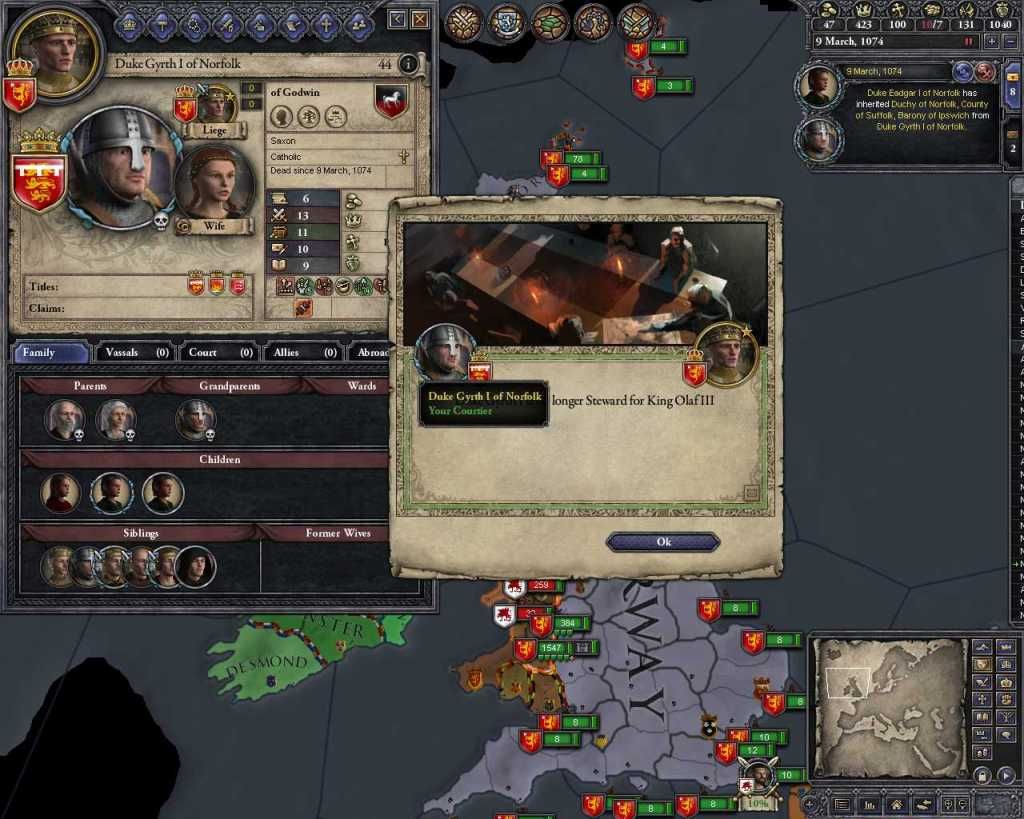
The death of Gyrth Godwinson on the 9th of March, 1074 certainly did wonders for King Olaf's morale as his levies steamrollered their way through Gwynedd, in the name of Maredudd ap Grufydd.
Not that he needed so much of a boost. After several more sieges and repelling of a foolish invasion of Chester, the war ended on 16 January, 1075, resulting in a complete victory for the Norwegian forces, and the proclamation of Maredudd ap Grufydd Seisyll as the new Duke of Gwynedd, after his oath of allegiance to Olaf and all his rightful heirs. It was at this moment in Mathrafal Castle, surrounded by his vassals, friends, and soldiers, that Olaf could have declared himself King of Wales.
Why didn't he do it? The answer is not all the complicated. He knew that the people of Wales, or Cymru as they called it, were not all too happy to be the subjects of a non-Welsh overlord, and if he tried to present himself as their legitimate king, it was quite possible that they would overthrow Maredudd as a quisling of the foreign king, and Olaf was sick and tired of years of rebellion in England. The only reason he had managed to hold on to the crown of England as well as that of Norway was probably the cultural similarities between the Norse and the Saxons, both being of North Germanic stock and thus possessing rather similar languages. The Welsh, however, were very different from Saxons or Norsemen, being the descendants of Romano-British who fled the Saxon takeovers following the Roman withdrawal.
As a result, Olaf was content with incorporating Gwynedd into the Kingdom of England's administrative structure, and letting Maredudd run it as he saw fit so long as he was loyal to his Norse overlords.
But as the levies of England and Norway made their way home, there was one of their leaders who would never make it back home alive.
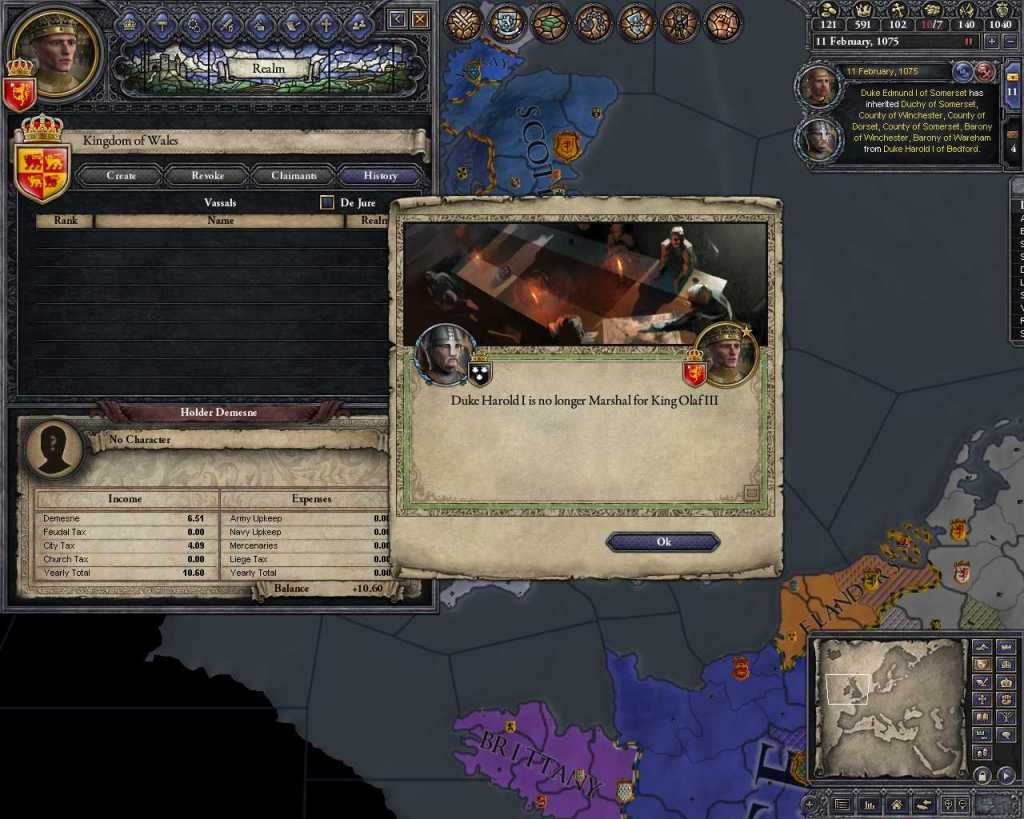
Finally, Olaf's nemesis was dead, and now only two Godwinsons were still alive:
Leofwine, the Duke of Kent who had never been too ardent in his opposition to the Yngling regime, and Tostig, who was exiled from England by Harold and the resulting vendetta Tostig had was what led to the landing of Harald Hardraada in England and the battle of York.
There was one more Saxon that Olaf needed out of the way
Excerpted from Son of the Raven by Gudrod Einarsson, self-published by the author.
Used with permission.
12 Febuary, 1075
He could hardly believe it. Harold Godwinson, earl, king, earl again, rebel, was finally dead, and no one could finger him, because he really did not do it. Not that he didn't want to have killed him with his own hands, but it was better that he would not be blamed. The funeral was set for a week from today, to allow for arrivals from far away. But for now Olaf concerned himself with another Saxon lord's death.
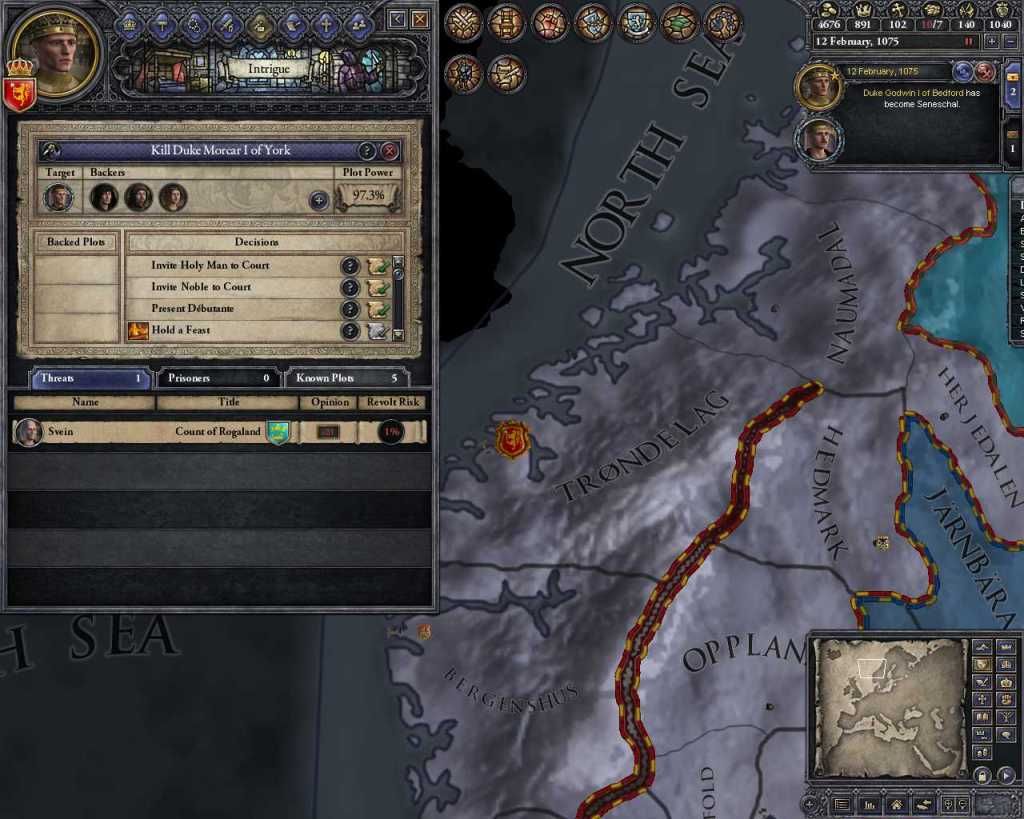
Already he had gathered three co-conspirators, including Ethelbeorht of Boston, Duke Morcar's spymaster.
Soon, he sensed, soon would be the time to strike. He made a note: Tell Ethelbeorht to execute.
28 September, 1075
Soon Morcar would be dead. The plan was brilliant, really. On 4 June he had made an appointment with a certain unladylike lady from Northumberland who was on a business trip in Norway, for him, Duke Morcar, and Ethelbeorht of Boston, for 28 September.
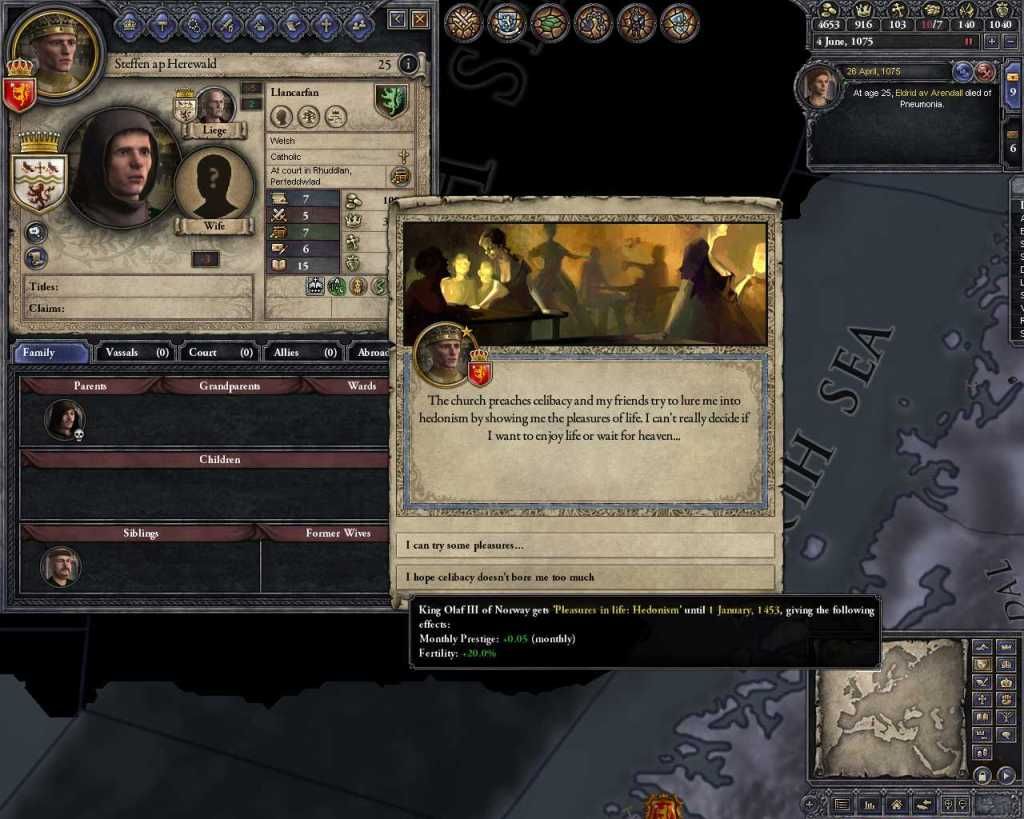
The pay being quite good, she agreed to wait for her payment until afterwards. Now they were entering her house, Morcar shaking like a boy at the prospect of his approaching pleasure. Morcar was to go first. Meanwhile, as the Duke of Northumberland was with the lady, Olaf and Ethelbeorht were ordering drinks in a nearby tavern. After a few rounds Ethelbeorht became rather merry and started blabbing about his personal life, his mistresses, and such other secrets. Olaf was shushing him all the time, barely managing to keep under cover of his fake identity 'Arnmod of Akershus'. When Morcar stepped in, he merrily said: "Ethelbeorht, it's your turn!" He looked happy enough to faint. Ethelbeorht looked up from his mug, and said: "Oh, my lord! I was just plotting to kill you, along with our friend the king."
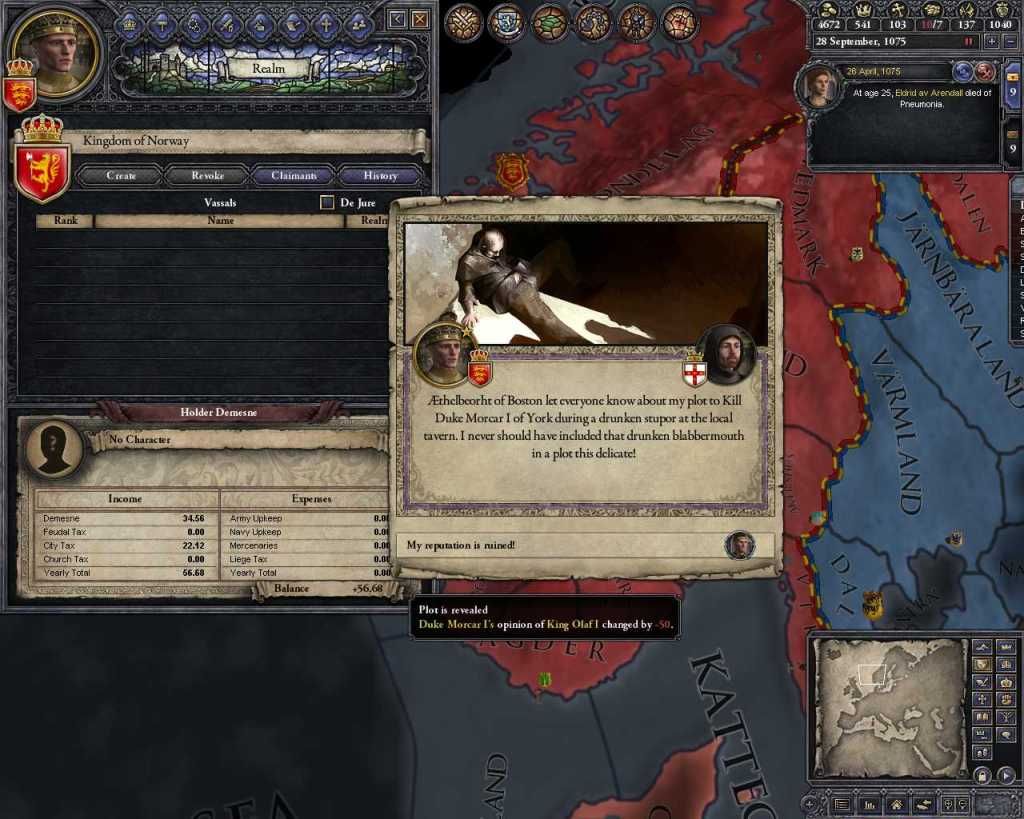
Chapter 14:
Triumphs
Excerpted from A Saga Without Heroes, by Erik Haraldsson, ©2012 Nidaros University Press
Used with permission.

The death of Gyrth Godwinson on the 9th of March, 1074 certainly did wonders for King Olaf's morale as his levies steamrollered their way through Gwynedd, in the name of Maredudd ap Grufydd.
Not that he needed so much of a boost. After several more sieges and repelling of a foolish invasion of Chester, the war ended on 16 January, 1075, resulting in a complete victory for the Norwegian forces, and the proclamation of Maredudd ap Grufydd Seisyll as the new Duke of Gwynedd, after his oath of allegiance to Olaf and all his rightful heirs. It was at this moment in Mathrafal Castle, surrounded by his vassals, friends, and soldiers, that Olaf could have declared himself King of Wales.
Why didn't he do it? The answer is not all the complicated. He knew that the people of Wales, or Cymru as they called it, were not all too happy to be the subjects of a non-Welsh overlord, and if he tried to present himself as their legitimate king, it was quite possible that they would overthrow Maredudd as a quisling of the foreign king, and Olaf was sick and tired of years of rebellion in England. The only reason he had managed to hold on to the crown of England as well as that of Norway was probably the cultural similarities between the Norse and the Saxons, both being of North Germanic stock and thus possessing rather similar languages. The Welsh, however, were very different from Saxons or Norsemen, being the descendants of Romano-British who fled the Saxon takeovers following the Roman withdrawal.
As a result, Olaf was content with incorporating Gwynedd into the Kingdom of England's administrative structure, and letting Maredudd run it as he saw fit so long as he was loyal to his Norse overlords.
But as the levies of England and Norway made their way home, there was one of their leaders who would never make it back home alive.

Finally, Olaf's nemesis was dead, and now only two Godwinsons were still alive:
Leofwine, the Duke of Kent who had never been too ardent in his opposition to the Yngling regime, and Tostig, who was exiled from England by Harold and the resulting vendetta Tostig had was what led to the landing of Harald Hardraada in England and the battle of York.
There was one more Saxon that Olaf needed out of the way
Excerpted from Son of the Raven by Gudrod Einarsson, self-published by the author.
Used with permission.
12 Febuary, 1075
He could hardly believe it. Harold Godwinson, earl, king, earl again, rebel, was finally dead, and no one could finger him, because he really did not do it. Not that he didn't want to have killed him with his own hands, but it was better that he would not be blamed. The funeral was set for a week from today, to allow for arrivals from far away. But for now Olaf concerned himself with another Saxon lord's death.

Already he had gathered three co-conspirators, including Ethelbeorht of Boston, Duke Morcar's spymaster.
Soon, he sensed, soon would be the time to strike. He made a note: Tell Ethelbeorht to execute.
28 September, 1075
Soon Morcar would be dead. The plan was brilliant, really. On 4 June he had made an appointment with a certain unladylike lady from Northumberland who was on a business trip in Norway, for him, Duke Morcar, and Ethelbeorht of Boston, for 28 September.

The pay being quite good, she agreed to wait for her payment until afterwards. Now they were entering her house, Morcar shaking like a boy at the prospect of his approaching pleasure. Morcar was to go first. Meanwhile, as the Duke of Northumberland was with the lady, Olaf and Ethelbeorht were ordering drinks in a nearby tavern. After a few rounds Ethelbeorht became rather merry and started blabbing about his personal life, his mistresses, and such other secrets. Olaf was shushing him all the time, barely managing to keep under cover of his fake identity 'Arnmod of Akershus'. When Morcar stepped in, he merrily said: "Ethelbeorht, it's your turn!" He looked happy enough to faint. Ethelbeorht looked up from his mug, and said: "Oh, my lord! I was just plotting to kill you, along with our friend the king."

Chapter 15:
Virility, Murder, and a Blind Pope
Excerpted from A Saga Without Heroes, by Erik Haraldsson, ©2012 Nidaros University Press.
Used with permission.
1075 drew to a close, fierce and rainy as any Norwegian winter. In November Queen Ingerid was pregnant again, having given birth to two sons for King Olaf: Harald and Sverre,
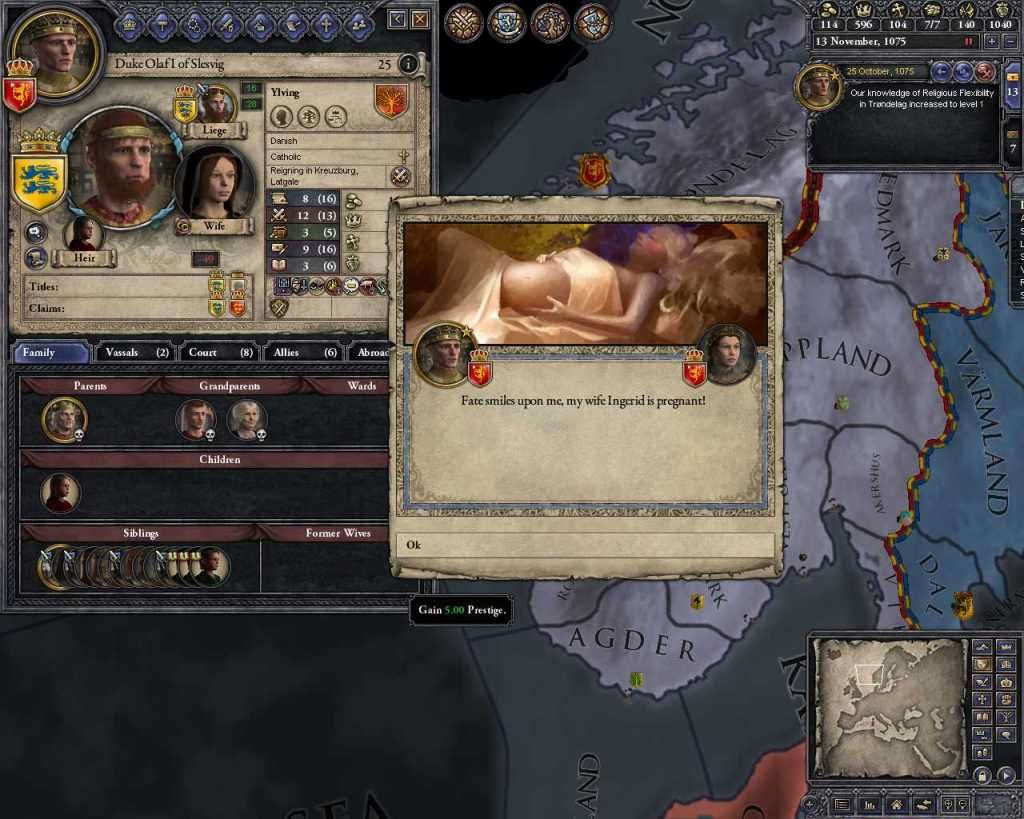
resulting in another boy, Arnmod, in June.
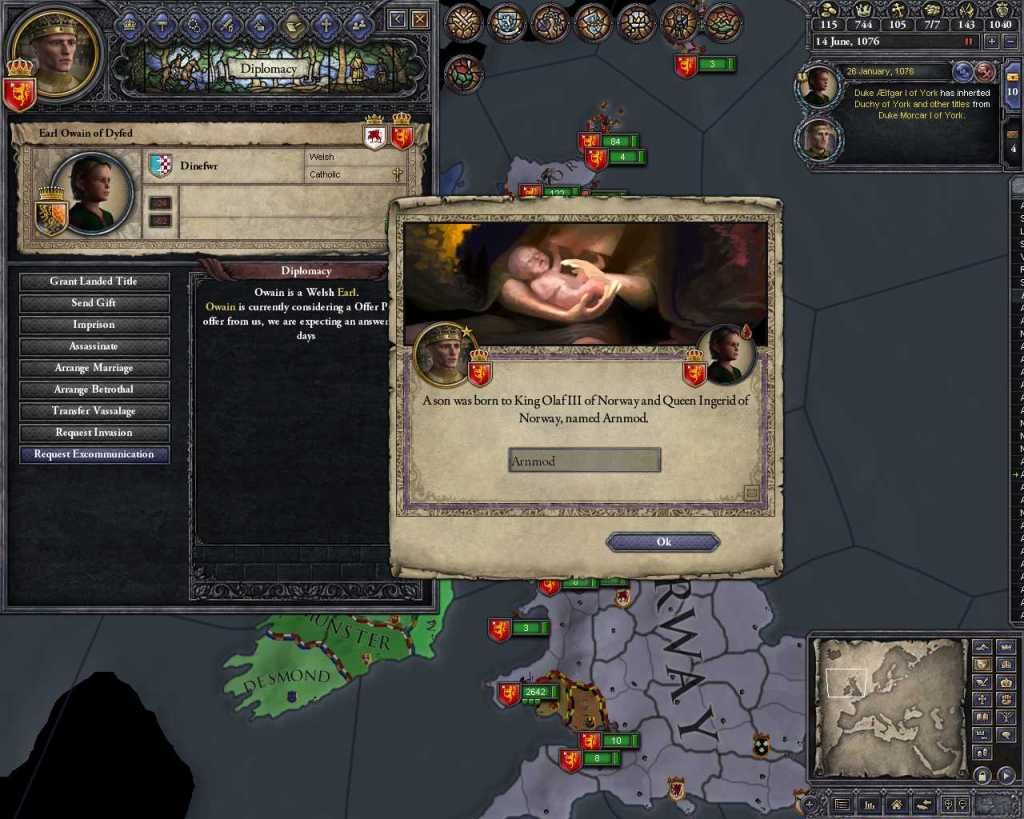
The second-to-last day of the year brought an evil wind to the realm of Duke Morcar, as Olaf tried again after the whorehouse failure.
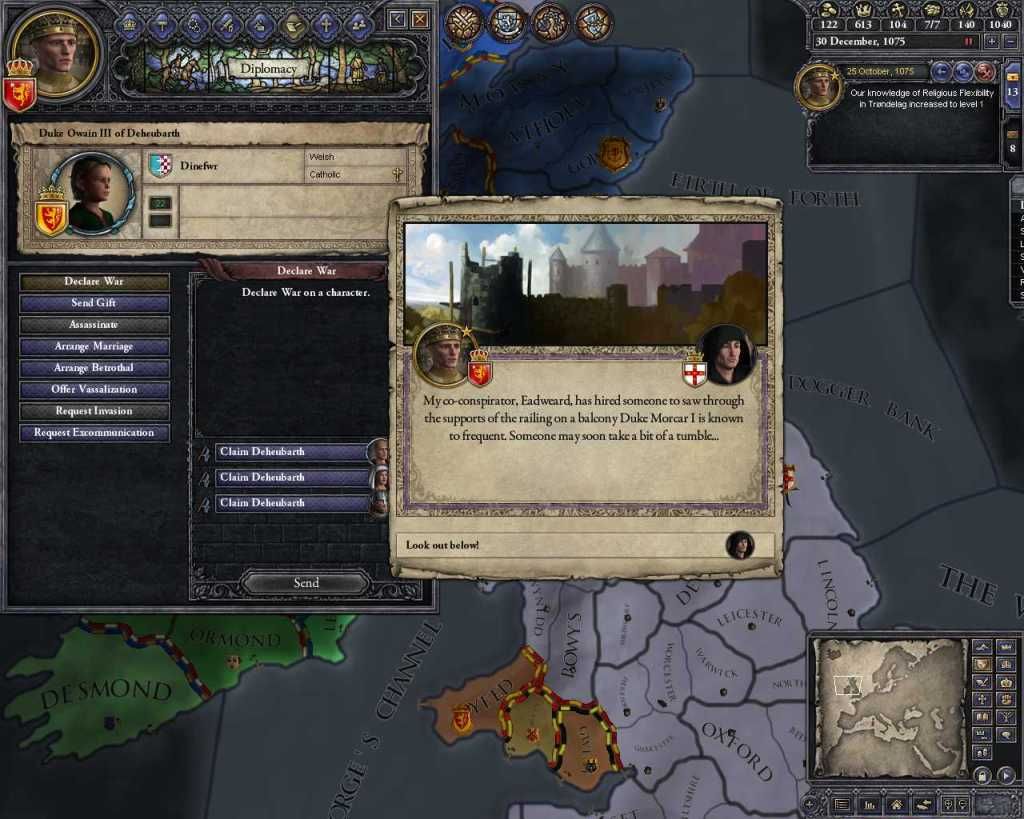 ,
,
and indeed a month later the younger Hwicce brother departed the earth in a not quite mysterious 'accident'.
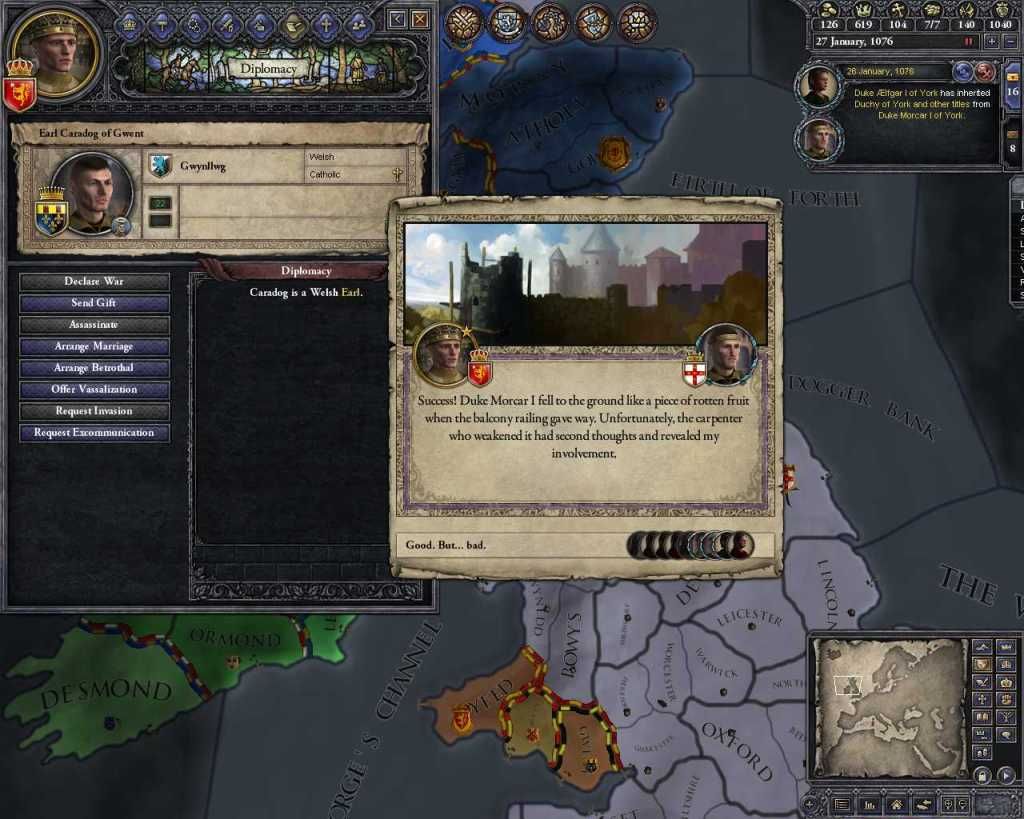
Still unsatisfied with the previous year's campaign in Gwynedd, King Olaf managed to pull off some miracle in raising the levies of the same lords who months before had been outraged with Morcar's murder, for a campaign to subjugate Deheubarth.
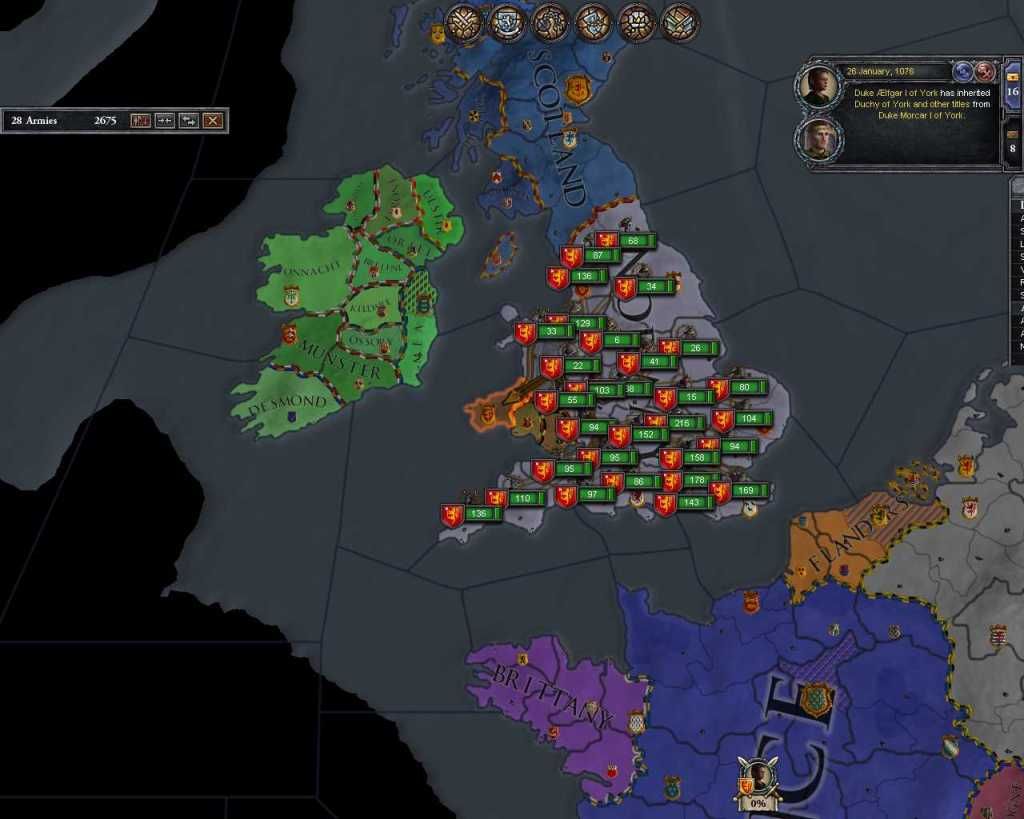
Needless to say, the campaign was quite short, ending on the same day as the birth of Prince Arnmod.
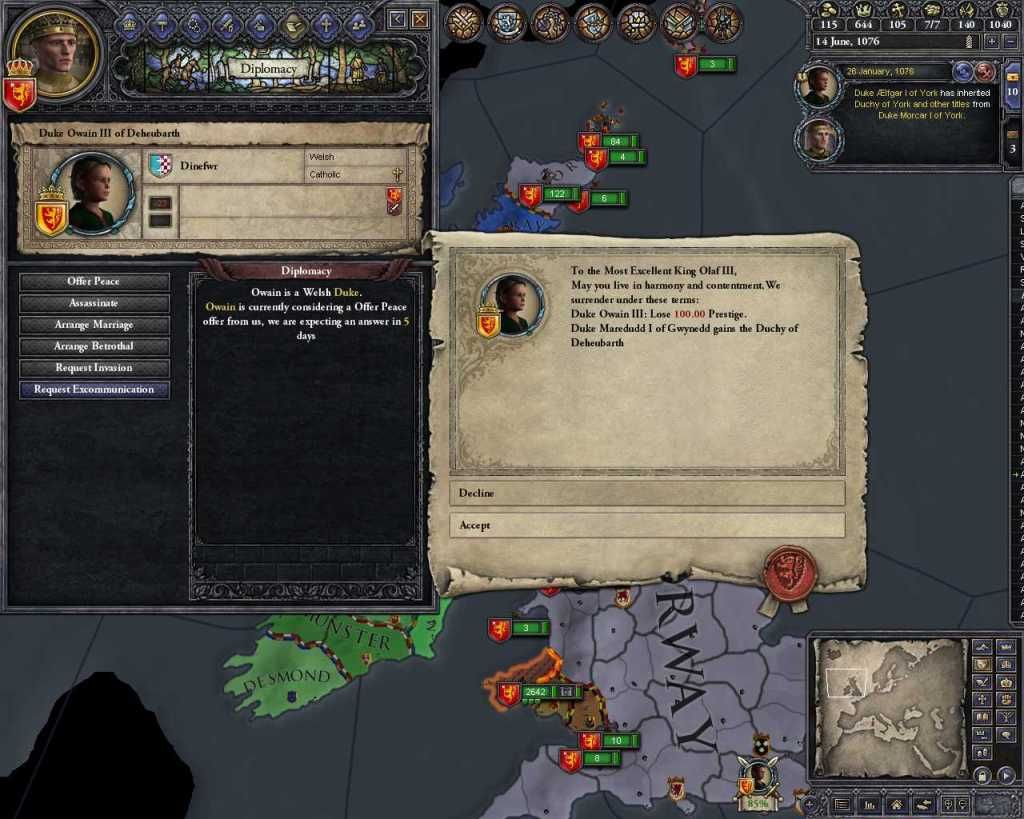
Although the counties of Glamorgan and Gwent would remain independent, as the years passed Maredudd ap Gruffydd, who had been granted the title of Deheubarth as well as that of Gwynedd would force both of them to submit to his authority, establishing him as lord of all Wales and also establishing his Norse overlord as ruler of all Britain south of the Firth of Forth.
There is not much to be said for the remaining years of the 1070s.
In November 1077 Ingerid was pregnant again, giving birth to another son, named Gunnar in June.
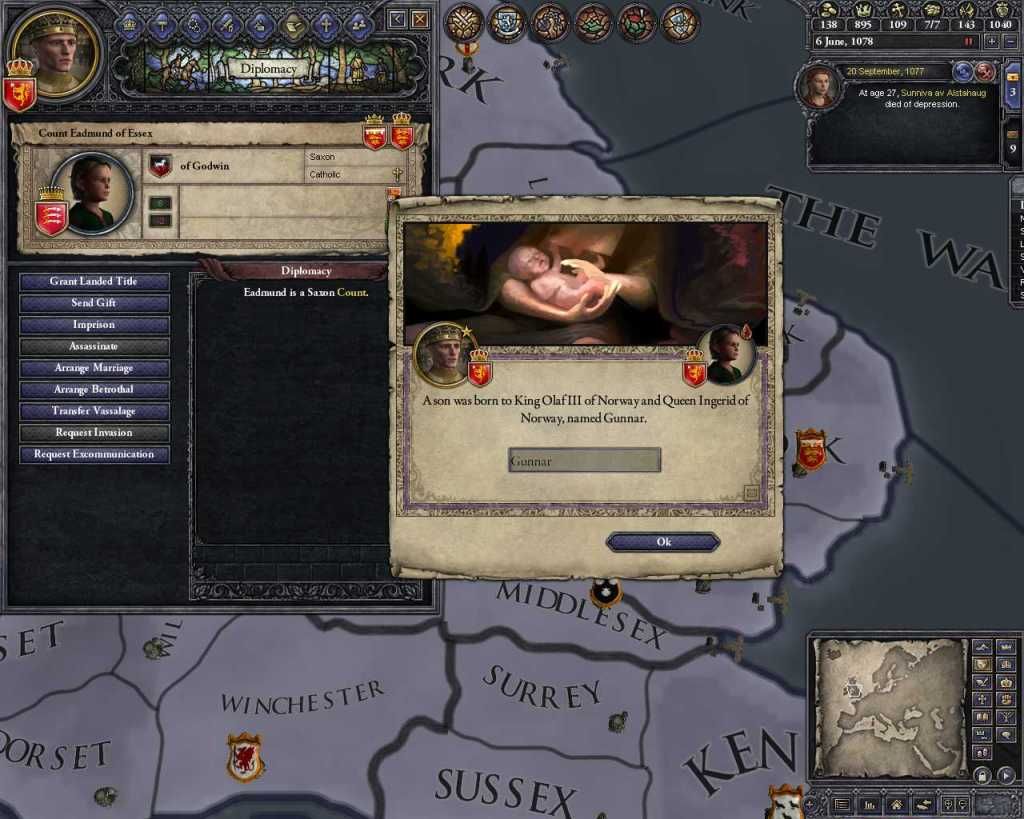
Although in June 1079 Eadwin, Duke of Lancaster, still bitter over Olaf's murder of his brother Morcar, rebelled, it barely merits a mention in the annals of the Yngling dynasty, being crushed with rather greater ease than the great rebellions of ten years previously, Ingerid giving birth to a daughter, Rannveig, in February 1080 as Olaf's might was being brought to bear on the elder Hwicce.
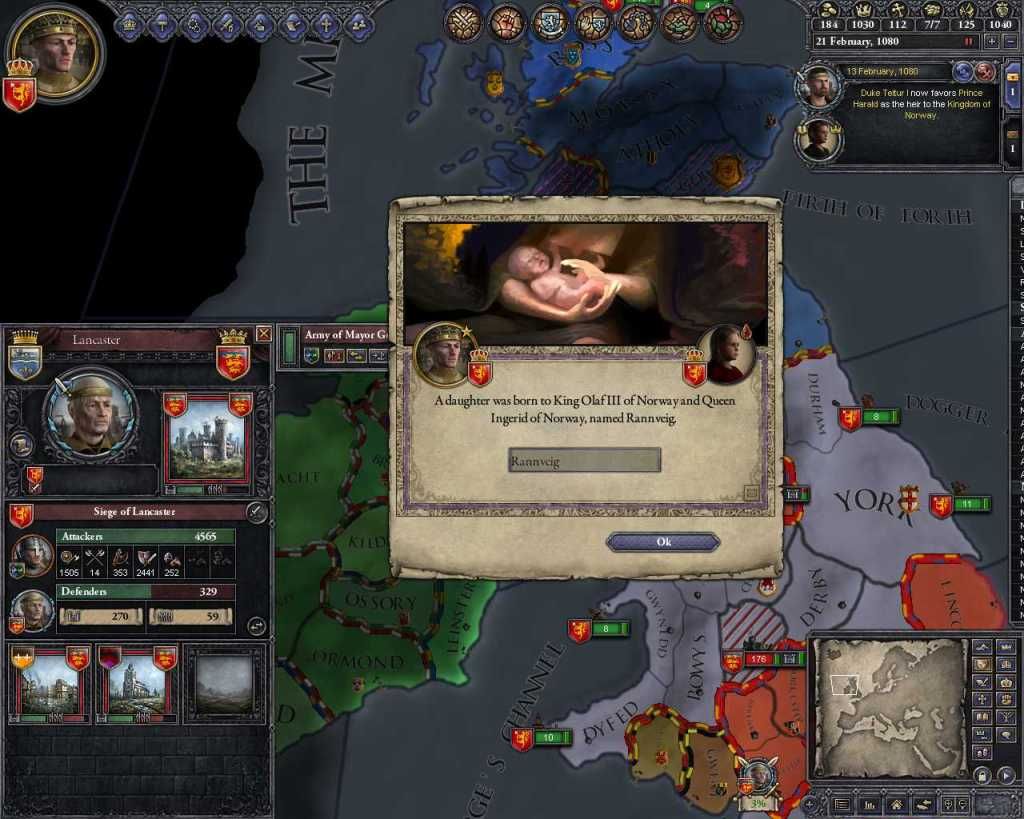
As the war was winding down towards its inevitable conclusion, though, altogether more grim news for all of Christendom arrived from the court of Robert d'Hauteville, a fellow Norseman.
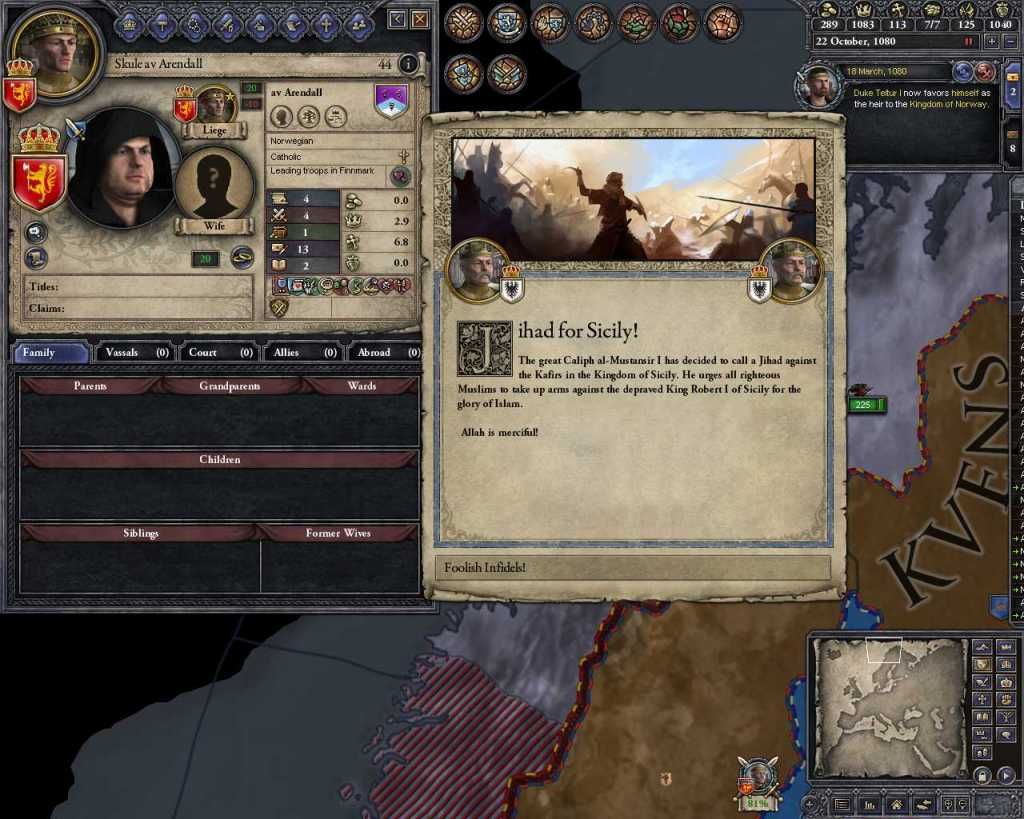
Though Eadwin would surrender on 28 November, resulting in imprisonment until his death a few years later, Olaf was still restless...
Excerpted from On This Rock: A History of the Papacy, by Snorri Akershus, chapter 8: The Blind Pope and the Muslim Caesar. ©2000 Bibilia Eccelsiatica Press.
Used with permission.
The proclamation of Jihad against King Robert 'Guiscard' d'Hauteville of Sicily, a papal ally and bulwark against the tides of Islamic warfare sent tremors throughout the Christian world, most of all in Rome. Pope John XIX, who would later be truly deserving, both physically and metaphorically, of the epithet 'the Blind', had not expected any such interruption to his cozy little reign that had begun with his election in 1075. The Papacy was not, shall we say, in the greatest temporal state as the armies of the Caliph of Cairo poured into Southern Italy as the 1080s began. Consequentially, John was helpless as he watched the banner of Islam make its way up the boot of Italy, sweeping away its Norman lords and Greek inhabitants as it advanced. He could not have said 'I am surprised', however, when on 16 December, 1081, Robert declared his surrender.
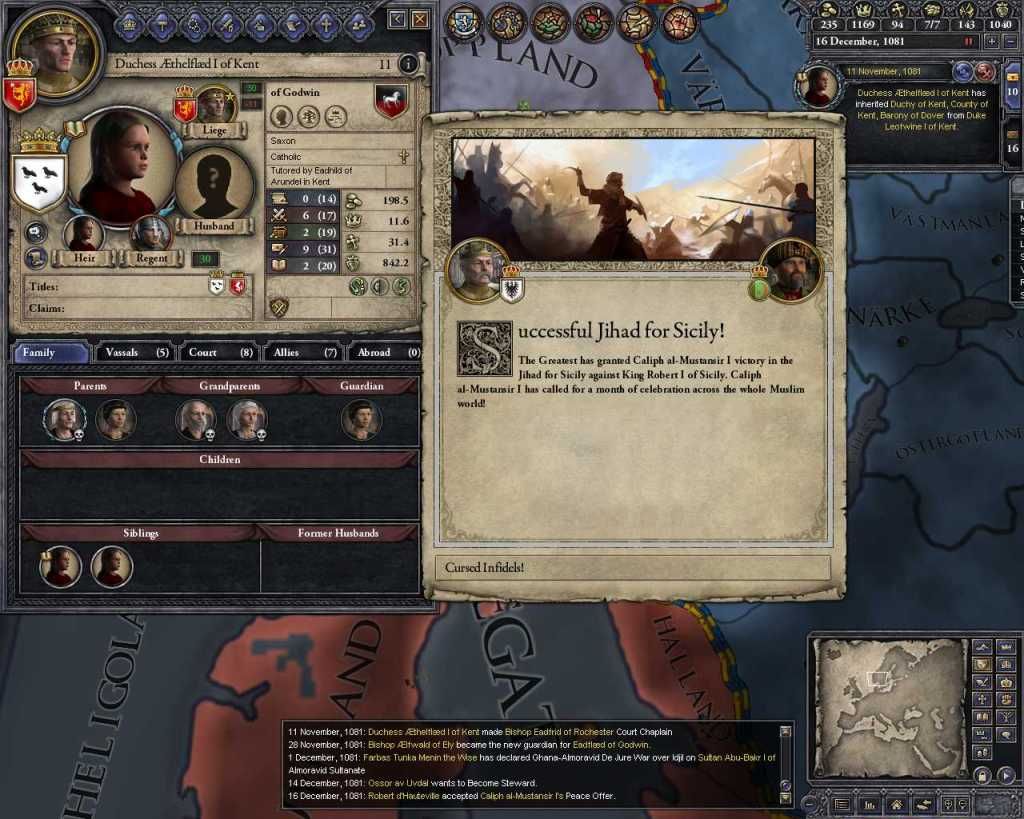
That very same day, to John's horror, a church near the castle of Benevento, a fief subject to the Holy See, was converted into a mosque for the coronation of Caliph al-Mustansir as the second King of Sicily, or as he styled himself: 'Sultan of Sicily'.
In Rome, and indeed across Italy and whatever of the Mediterranean that remained in Christian hands, one word was on everybody's lips.
Crusade.
Virility, Murder, and a Blind Pope
Excerpted from A Saga Without Heroes, by Erik Haraldsson, ©2012 Nidaros University Press.
Used with permission.
1075 drew to a close, fierce and rainy as any Norwegian winter. In November Queen Ingerid was pregnant again, having given birth to two sons for King Olaf: Harald and Sverre,

resulting in another boy, Arnmod, in June.

The second-to-last day of the year brought an evil wind to the realm of Duke Morcar, as Olaf tried again after the whorehouse failure.

and indeed a month later the younger Hwicce brother departed the earth in a not quite mysterious 'accident'.

Still unsatisfied with the previous year's campaign in Gwynedd, King Olaf managed to pull off some miracle in raising the levies of the same lords who months before had been outraged with Morcar's murder, for a campaign to subjugate Deheubarth.

Needless to say, the campaign was quite short, ending on the same day as the birth of Prince Arnmod.

Although the counties of Glamorgan and Gwent would remain independent, as the years passed Maredudd ap Gruffydd, who had been granted the title of Deheubarth as well as that of Gwynedd would force both of them to submit to his authority, establishing him as lord of all Wales and also establishing his Norse overlord as ruler of all Britain south of the Firth of Forth.
There is not much to be said for the remaining years of the 1070s.
In November 1077 Ingerid was pregnant again, giving birth to another son, named Gunnar in June.

Although in June 1079 Eadwin, Duke of Lancaster, still bitter over Olaf's murder of his brother Morcar, rebelled, it barely merits a mention in the annals of the Yngling dynasty, being crushed with rather greater ease than the great rebellions of ten years previously, Ingerid giving birth to a daughter, Rannveig, in February 1080 as Olaf's might was being brought to bear on the elder Hwicce.

As the war was winding down towards its inevitable conclusion, though, altogether more grim news for all of Christendom arrived from the court of Robert d'Hauteville, a fellow Norseman.

Though Eadwin would surrender on 28 November, resulting in imprisonment until his death a few years later, Olaf was still restless...
Excerpted from On This Rock: A History of the Papacy, by Snorri Akershus, chapter 8: The Blind Pope and the Muslim Caesar. ©2000 Bibilia Eccelsiatica Press.
Used with permission.
The proclamation of Jihad against King Robert 'Guiscard' d'Hauteville of Sicily, a papal ally and bulwark against the tides of Islamic warfare sent tremors throughout the Christian world, most of all in Rome. Pope John XIX, who would later be truly deserving, both physically and metaphorically, of the epithet 'the Blind', had not expected any such interruption to his cozy little reign that had begun with his election in 1075. The Papacy was not, shall we say, in the greatest temporal state as the armies of the Caliph of Cairo poured into Southern Italy as the 1080s began. Consequentially, John was helpless as he watched the banner of Islam make its way up the boot of Italy, sweeping away its Norman lords and Greek inhabitants as it advanced. He could not have said 'I am surprised', however, when on 16 December, 1081, Robert declared his surrender.

That very same day, to John's horror, a church near the castle of Benevento, a fief subject to the Holy See, was converted into a mosque for the coronation of Caliph al-Mustansir as the second King of Sicily, or as he styled himself: 'Sultan of Sicily'.
In Rome, and indeed across Italy and whatever of the Mediterranean that remained in Christian hands, one word was on everybody's lips.
Crusade.
Last edited:
(OOC: Enjoy the update, (sorry for no pics), and be sure to vote for this AAR in the Favorite CK 1/2 AAR category in round 3 of the AARland Choice Awards for 2012, as Avindian has done, over here.)
Chapter 16:
The North is Conquered
Excerpted from On This Rock: A History of the Papacy by Snorri Akershus, ©2000 Bibilia Eccelesiatica Press.
Used with permission.
As the 1080s wore on, Pope John looked on in horror as year after year, the Caliph in Cairo, al-Mustanasir, continued his attempts to convert his new 'Sultanate of Sicily' to what John would later, in a declaration to Christendom call 'the false, demonic cult of Mahomet'. The entire ruling class of Robert d'Hauteville, [who in the meantime had been invited to the court of King Olaf of Norway and England, serving in the capacity of spymaster (although in fact, the list of spymasters of the Kings of Norway would not be published until the twentieth century), and even receiving the county of Herjalden a few months before his death at the biblical threescore-and-ten] was turned out in favor of a new group of Muslim Jihadis who were rewarded with sheikdoms and even a few emirates in Italy. Castle Benevento would, however, remain under its baron John of Benevento, a papal vassal, in increasing fear of Muslim assault. But John looked north, to what the Holy Roman Emperors called 'the kingdom of Italy', south of the Alps, and found reassurance in crowning the new emperors, gaining their favors and hopefully, protection from attack.
But, in 1089, this shield shattered when the Caliph declared an invasion of Italy, making war on the Empire. At first, John made the aforementioned declaration, in which he stated his absolute faith in Christ who would protect the good Catholics of Northern Italy from the fury of 'the Saracen', and indeed all Christendom was buoyed up with faith when the news of the Caliph's death in battle against the Kaiser's armies. But the war continued under the energetic new Caliph Nuraddin, who had formerly been Emir of Axum. In 1091 John's faith in God and the Kaiser (in that order) seemed to be a bitter illusion when the Emperor surrendered Italy to the Caliphate of Egypt. This time there was no coronation for Nuraddin, and in most cases the Christian lords, mayors, and doges were allowed to keep their positions, provided they swore allegiance to the Caliph. Faced with the scimitar of the self-proclaimed 'Jihadi of Jihadis', they all did so. This reverse finally shattered John's metaphorical blindness to the sorry state of the Faith in Italy, and so the long-expected proclamation finally came out of St. Peter's:
Crusade.
Excerpted from Son of the Raven, by Gudrod Einarsson. ©2012 the author.
Used with permission.
1091. Although a few months had passed since the royal New Year's celebration, Olaf still found it difficult to comprehend the entrance of a new decade. Hadn't the 1080s just begun? It wasn't as if the decade passed was uneventful, oh no. There had been a holy war that had incorporated Jamtland, formerly a county belonging to the heathen dukes of that same name, into the realm and hopefully, soon, into the Holy Church. There had been a rebellion by Godwin Haroldson, who had inherited the Duchy of Bedford from his father, but that had been crushed quickly. Then, approaching the end of the decade, Olaf had noticed Duke Teitur of Iceland, who had inherited Iceland from his father Isleifur some years previously, was consistently flip-flopping between support for himself as the next king of Norway, and support for Olaf's obvious candidate, yound Harald, Count of Oppland, his eldest son and heir who only had a few years to go before he came of age and married King Duncan of Scotland's sister Margaret, as had been arranged at Harald's birth.
Setting aside the annoyance of constantly receiving messages from Teitur concerning his candidate for the Norse succession, this flip-flopping illustrated the inherent weakness the Norse crown's succession law imposed on the Crown. If the dukes of Norway could just put themselves forward for King, what was the royal authority worth? Indeed, Olaf now conjectured that his father had a plan to end this weakness on his dynasty's part after the conquest of England, unfortunately, of course, this plan never came into action due to Harald's comatose state following his injury at the Battle of York and subsequent death. Olaf, though, in 1087 announced that beginning with his death (hopefully far in the future), there would be no council of the lords to determine the next king. Instead, from henceforth, on each king's death, the eldest member of the Yngling clan would inherit all of his lands in the Kingdom of Norway. Although this could cause the crown to alternate between various branches, for now (due to Magnus's 'death' that Olaf claimed) Harald Olafsson was the most senior Yngling after his father, and would inherit everything. Olaf hoped that Harald would be able to implement the primogeniture model, in which the eldest son (or, as in some countries the eldest daughter if there were no sons) inherited everything, as in England.
As he looked out the window of Nidaros Castle, Olaf thought of his father. He imagined Harald would see through all of Olaf's self-deception that he was worthy of his father. Surely, Harald could have conquered England without his help, Gwynedd and Deheubarth and Jamtland even more certainly so. If Harald was not incapacitated, if York fell before the arrival of Harold's army back in 1066, if the Norsemen and Englishmen had clashed somewhere else, would they still have won? Olaf considered these might-have-beens as silence continued its reign over the North Sea. Suddenly, he was woken from his contemplative state by an envoy bearing the arms of the Papacy. He said, "Great King, I bear word from the Holy Father in Rome. He calls for a great Crusade of all good Christians to cast the infidel out of Italy and thus save it from the eternal darkness of Mahomet. He also says that all who particpate will be absolved of all their sins and those who die will be great martyrs. I have come to ask for your help in this great, noble, and pious endavor. What do you say? Will you save your Christian brothers and in doing so your soul as well?"
Olaf took only a moment to answer. "Yes, indeed I shall. I will march for God, for Christ, and for salvation!"
His father would have been proud.
Chapter 16:
The North is Conquered
Excerpted from On This Rock: A History of the Papacy by Snorri Akershus, ©2000 Bibilia Eccelesiatica Press.
Used with permission.
As the 1080s wore on, Pope John looked on in horror as year after year, the Caliph in Cairo, al-Mustanasir, continued his attempts to convert his new 'Sultanate of Sicily' to what John would later, in a declaration to Christendom call 'the false, demonic cult of Mahomet'. The entire ruling class of Robert d'Hauteville, [who in the meantime had been invited to the court of King Olaf of Norway and England, serving in the capacity of spymaster (although in fact, the list of spymasters of the Kings of Norway would not be published until the twentieth century), and even receiving the county of Herjalden a few months before his death at the biblical threescore-and-ten] was turned out in favor of a new group of Muslim Jihadis who were rewarded with sheikdoms and even a few emirates in Italy. Castle Benevento would, however, remain under its baron John of Benevento, a papal vassal, in increasing fear of Muslim assault. But John looked north, to what the Holy Roman Emperors called 'the kingdom of Italy', south of the Alps, and found reassurance in crowning the new emperors, gaining their favors and hopefully, protection from attack.
But, in 1089, this shield shattered when the Caliph declared an invasion of Italy, making war on the Empire. At first, John made the aforementioned declaration, in which he stated his absolute faith in Christ who would protect the good Catholics of Northern Italy from the fury of 'the Saracen', and indeed all Christendom was buoyed up with faith when the news of the Caliph's death in battle against the Kaiser's armies. But the war continued under the energetic new Caliph Nuraddin, who had formerly been Emir of Axum. In 1091 John's faith in God and the Kaiser (in that order) seemed to be a bitter illusion when the Emperor surrendered Italy to the Caliphate of Egypt. This time there was no coronation for Nuraddin, and in most cases the Christian lords, mayors, and doges were allowed to keep their positions, provided they swore allegiance to the Caliph. Faced with the scimitar of the self-proclaimed 'Jihadi of Jihadis', they all did so. This reverse finally shattered John's metaphorical blindness to the sorry state of the Faith in Italy, and so the long-expected proclamation finally came out of St. Peter's:
Crusade.
Excerpted from Son of the Raven, by Gudrod Einarsson. ©2012 the author.
Used with permission.
1091. Although a few months had passed since the royal New Year's celebration, Olaf still found it difficult to comprehend the entrance of a new decade. Hadn't the 1080s just begun? It wasn't as if the decade passed was uneventful, oh no. There had been a holy war that had incorporated Jamtland, formerly a county belonging to the heathen dukes of that same name, into the realm and hopefully, soon, into the Holy Church. There had been a rebellion by Godwin Haroldson, who had inherited the Duchy of Bedford from his father, but that had been crushed quickly. Then, approaching the end of the decade, Olaf had noticed Duke Teitur of Iceland, who had inherited Iceland from his father Isleifur some years previously, was consistently flip-flopping between support for himself as the next king of Norway, and support for Olaf's obvious candidate, yound Harald, Count of Oppland, his eldest son and heir who only had a few years to go before he came of age and married King Duncan of Scotland's sister Margaret, as had been arranged at Harald's birth.
Setting aside the annoyance of constantly receiving messages from Teitur concerning his candidate for the Norse succession, this flip-flopping illustrated the inherent weakness the Norse crown's succession law imposed on the Crown. If the dukes of Norway could just put themselves forward for King, what was the royal authority worth? Indeed, Olaf now conjectured that his father had a plan to end this weakness on his dynasty's part after the conquest of England, unfortunately, of course, this plan never came into action due to Harald's comatose state following his injury at the Battle of York and subsequent death. Olaf, though, in 1087 announced that beginning with his death (hopefully far in the future), there would be no council of the lords to determine the next king. Instead, from henceforth, on each king's death, the eldest member of the Yngling clan would inherit all of his lands in the Kingdom of Norway. Although this could cause the crown to alternate between various branches, for now (due to Magnus's 'death' that Olaf claimed) Harald Olafsson was the most senior Yngling after his father, and would inherit everything. Olaf hoped that Harald would be able to implement the primogeniture model, in which the eldest son (or, as in some countries the eldest daughter if there were no sons) inherited everything, as in England.
As he looked out the window of Nidaros Castle, Olaf thought of his father. He imagined Harald would see through all of Olaf's self-deception that he was worthy of his father. Surely, Harald could have conquered England without his help, Gwynedd and Deheubarth and Jamtland even more certainly so. If Harald was not incapacitated, if York fell before the arrival of Harold's army back in 1066, if the Norsemen and Englishmen had clashed somewhere else, would they still have won? Olaf considered these might-have-beens as silence continued its reign over the North Sea. Suddenly, he was woken from his contemplative state by an envoy bearing the arms of the Papacy. He said, "Great King, I bear word from the Holy Father in Rome. He calls for a great Crusade of all good Christians to cast the infidel out of Italy and thus save it from the eternal darkness of Mahomet. He also says that all who particpate will be absolved of all their sins and those who die will be great martyrs. I have come to ask for your help in this great, noble, and pious endavor. What do you say? Will you save your Christian brothers and in doing so your soul as well?"
Olaf took only a moment to answer. "Yes, indeed I shall. I will march for God, for Christ, and for salvation!"
His father would have been proud.
Last edited:
I had not attentioned your AAR :blush: .Very energetic one bro full of blood and children like the North should be 
Be careful because also here the North is cunning mate but I am sure you are ready for this .These Englishmen are not trustworthy .. crush them
Kind of hard when you're on crusade far away (this isn't Rebelcrusher Kings II), but yes, those Englishmen are definitely untrustworthy...
Definitely you should not concetrate solely on rebel crushing but keep some leveis untouched because I fear that there will be more rounds of Rebellion before feel fairly safe
i have had (as the lion's share of page 1 of this AAR proves) loads of rebellions from those Saxon bastards but the day is not far off that 'Englishmen' will be as Norse as King Olaf... see next update for details!
Mega Campaigns are so rare ... Good job with this one !
Also, do you play with mods ?
Also, do you play with mods ?
nope, none at all (although in EU3 I will change the end date to the 31st of December 1835, to avoid having an unexplained (in-universe) gap between the end of EU3 in 1821 and the beginning of Victoria 2 in 1836, and I will also change the end date of AoD to play at least until 1966 (thus completing nine centuries of history- see OP) or maybe until 2016 (950 years and also the year I turn 18, but that's unlikely due to the absurdity of technology not developing past levels of OTL 1950, but if there will be a user-made HoI3 to East vs. West converter i may use that)
coming tomorrow or sunday (blasted math homework over vacation! who the hell cares about how to solve equations with square roots!)

